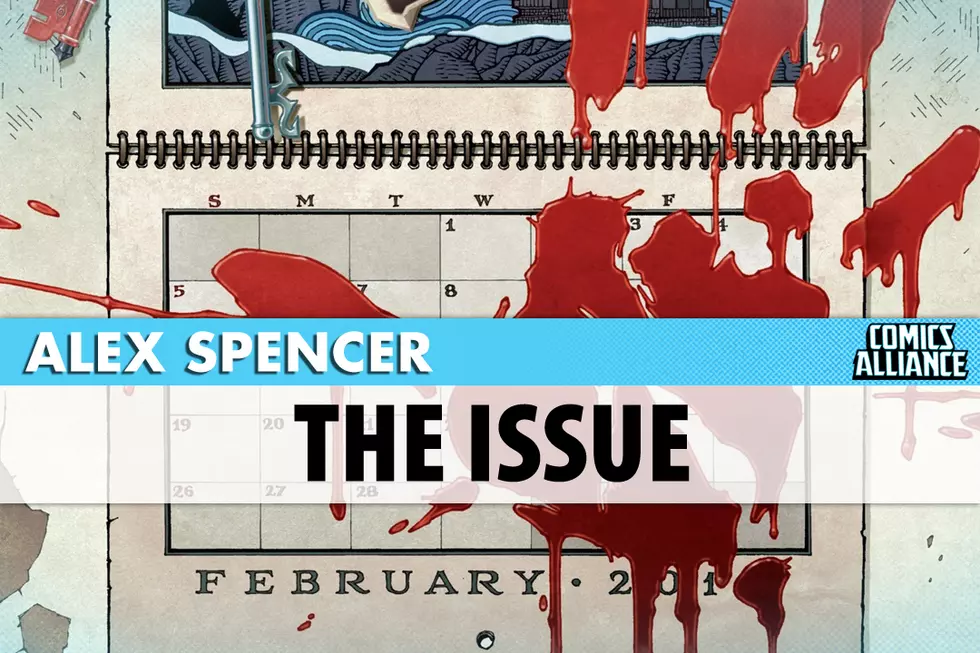
The Issue: The Not So Just So Story Of Rudyard Kipling And ‘The Unwritten’ #5
Welcome to The Issue, where we look at some of the strangest, most interesting and most distinctive single issue comic stories ever to grace the medium. You know the ones; silent issues, sideways issues, backwards issues... Even, in this case, issues that abandon the main story and setting of the series altogether.
Mike Carey and Peter Gross' The Unwritten is a Vertigo fantasy thriller starring Tom Taylor, the namesake --- and potentially word-made-flesh incarnation --- of fictional boy wizard Tommy Taylor, as he tries to take down the shadowy cabal threatening his life. At the end of issue #4, we're left with a major cliffhanger, with Tom arrested for a murder he didn't commit, a killer on the loose, and the unexplained appearance of his magical alter ego's pet winged cat.
Instead of picking up those threads, The Unwritten #5, "How The Whale Became," recounts the life story of Rudyard Kipling, author of The Jungle Book, a full two centuries before Tom's tale begins. There's no explicit magic in the issue, and most of the events it depicts are a matter of historical record.
Which might not sound like much fun unless, like me, you're an English Literature graduate who thinks Oscar Wilde is the best special guest star this side of Dr Doom. But only most of the events in this issue are true, and that's where it starts to get really interesting.
Because as we're taken through real events from Kipling's life --- the happenstance that pushed him from a lowly hack on an Indian newspaper to prophet of the British Empire; his two meetings with Mark Twain; the untimely deaths of his daughter and son --- they're altered to fit into the wider story of The Unwritten, with the help of the aforementioned shadowy cabal.
It's a deal with this particular devil that pushes Kipling to the top. When he meets Mark Twain, instead of discussing the difficulties of copyright, it's revealed that Twain was offered the same deal but, like the literary badass that he is, turned them down. When Kipling gathers his courage and follows suit, rebelling by changing the kind of stories he tells, his daughter dies in suspicious circumstances.
This mixture of real history and invention is compelling because, with all overtly supernatural elements excised from the issue, it's all so nearly plausible. This is helped by the shift in Gross' style, which leans more heavily on hatched shadows to match the illustrations of the period, so that this feels like an alternative biography. You don't need to know much about Kipling's actual life --- I certainly didn't --- to feel the thrill of a truth being quietly infiltrated by a lie.
Which is exactly the business of The Unwritten, which as a series begins by asking, "Is Tom a real person or a fictional construct come to life?" A question that gradually transmutes into, "What is the difference between a story and a lie?"
Because telling stories is just telling lies, something that all of the authors who appear in this story acknowledged at one time or another. Mark Twain told Kipling in one of their real-life meetings, "Get your facts first and then you can distort 'em as much as you please." Oscar Wilde wrote an entire essay called The Decay of Lying. Rudyard Kipling himself described lying as a child as "the foundation of literary effort."
But generally, people prefer not to think of the stories we read or watch or tell as lies, because it reminds us of how dangerous they can be. In the case of this issue, the lie being sold is the myth of the British Empire, something Kipling promotes in his early poems and stories. The superiority of Britain and its God-given right to exercise power across the globe is a narrative that is still dangerous to this day, whether in the rise of right wing anti-immigrant UKIP during Britain's last election, or recent tabloid headlines endorsing Britain's bombing of Syria.
The Unwritten's baddies punish Kipling for breaking away from this narrative. With his son missing in action in the French trenches, the cabal refuses him help. His situation is summed up wonderfully by two pages that echo each other from nearly opposite ends of the issue.
The first reproduces Kipling's poem The White Man's Burden which is, depending on your reading, either exactly as icky as it sounds or a subtle work of satire that was misunderstood by an empire-hungry public. The issue takes the poem at face value, and overlays it on three page-width panels depicting Kipling's rise to fame, peppered with his hand-written narration.
When this layout appears again, Kipling is in decline. Instead of celebrating crowds, the images are of bodies piled in trenches. Instead of a family home, we see the British concentration camps of the Boer war.
It's not a perfect copy of the format. The three panels are squished into the top half of the page, to make room for another two plot-advancing panels of Kipling and his wife. But the images themselves rhyme perfectly --- look at the silhouetted men, laborers in the idealised past contrasted with doomed soldiers, the unchanging colours of Carrie Kipling's outfit --- so that the differences come off as a corruption of the form. The regular size and shape of each panels is lost. The clean line of each border becomes unsteady. Even the clean white of the page starts to turn a sickly yellow.
It's an affecting moment, evocative of a man and a world in decline. But in reality, Kipling's story is a little more complicated. He continued to write imperialist poetry well past the beginning of the Just So Stories that this issue paints as his rebellion. He even wrote war propaganda for the British government during the First World War, up until his son was killed.
But that doesn't really fit the narrative that Carey and Gross are telling. Their story is about a small and powerless protagonist fighting against a much bigger and more powerful aggressor. I've borrowed that phrase, by the way, from the comics' own reading of the Just So Stories --- beautifully retold by Gross, adopting a simpler line, with Chris Chucky's colours introducing a papery texture to the pages.
It's a wonderful way of looking at works that most of us would disregard as children's tales, but it also requires some editing. We see the stories that fit Carey's argument, and ignore the ones that don't because it's hard to read the tale of an ill-mannered rhinoceros who leaves his skin on the beach while he goes for a swim as a parable of man versus institution.
That's how storytelling works. Just like "How The Whale Became," shuffling around the events of Kipling's life so that they condense into a neat 24-page story. Just like, over the past thousand words, I've ignored whole swathes of the issue to get us to this point. I've not even mentioned the damn Natasha Bedingfield song I've had stuck in my head the whole time. Writers are liars. I tried to warn you.
More From ComicsAlliance
![The Issue: Double Exposure In ‘Shutter’ #23 [Fantasy Week]](http://townsquare.media/site/622/files/2016/10/TheIssue-Shutter.jpg?w=980&q=75)
![The Issue: Cold And Alone In ‘Transmetropolitan’ #8 [Sci-Fi Week]](http://townsquare.media/site/622/files/2016/09/TheIssue-Transmet.jpg?w=980&q=75)
![The Issue: Time To Choose Your Own Adventure Time [Kids’ Comics]](http://townsquare.media/site/622/files/2016/08/TheIssue-AdventureTime.jpg?w=980&q=75)

![The Issue: ‘Generation Hope’ And The Pain Of Being Different [Pride Week]](http://townsquare.media/site/622/files/2016/06/PrideWeek-TheIssue.jpg?w=980&q=75)
![The Issue: X-Amining (and Re-X-Amining) X-Factor’s Therapy Sessions [Mutant Week]](http://townsquare.media/site/622/files/2016/05/TheIssue-xfactor.jpg?w=980&q=75)



